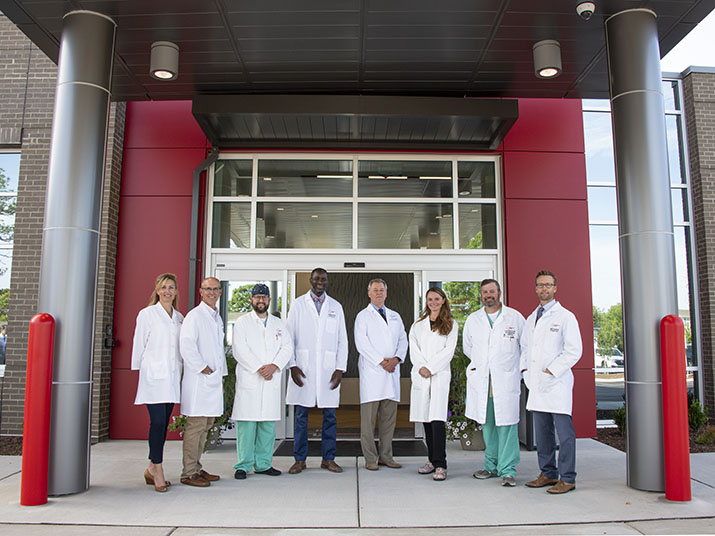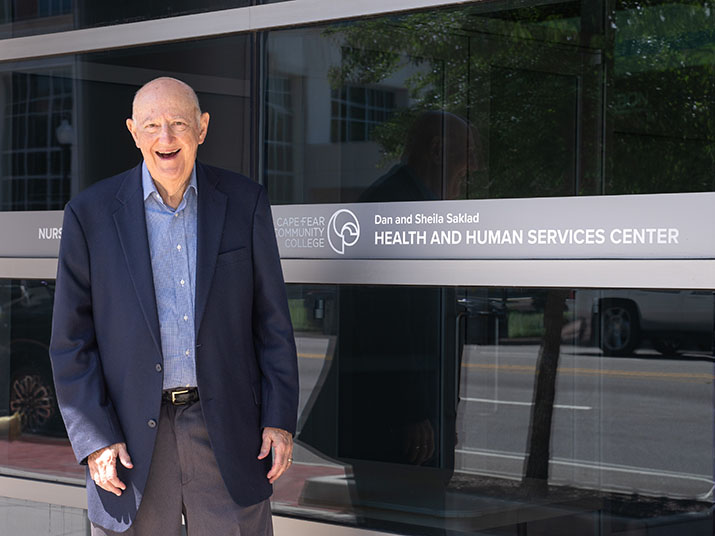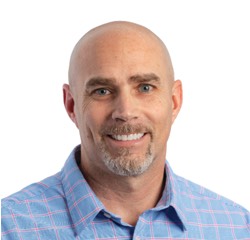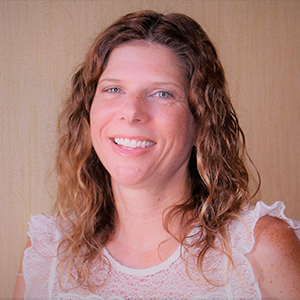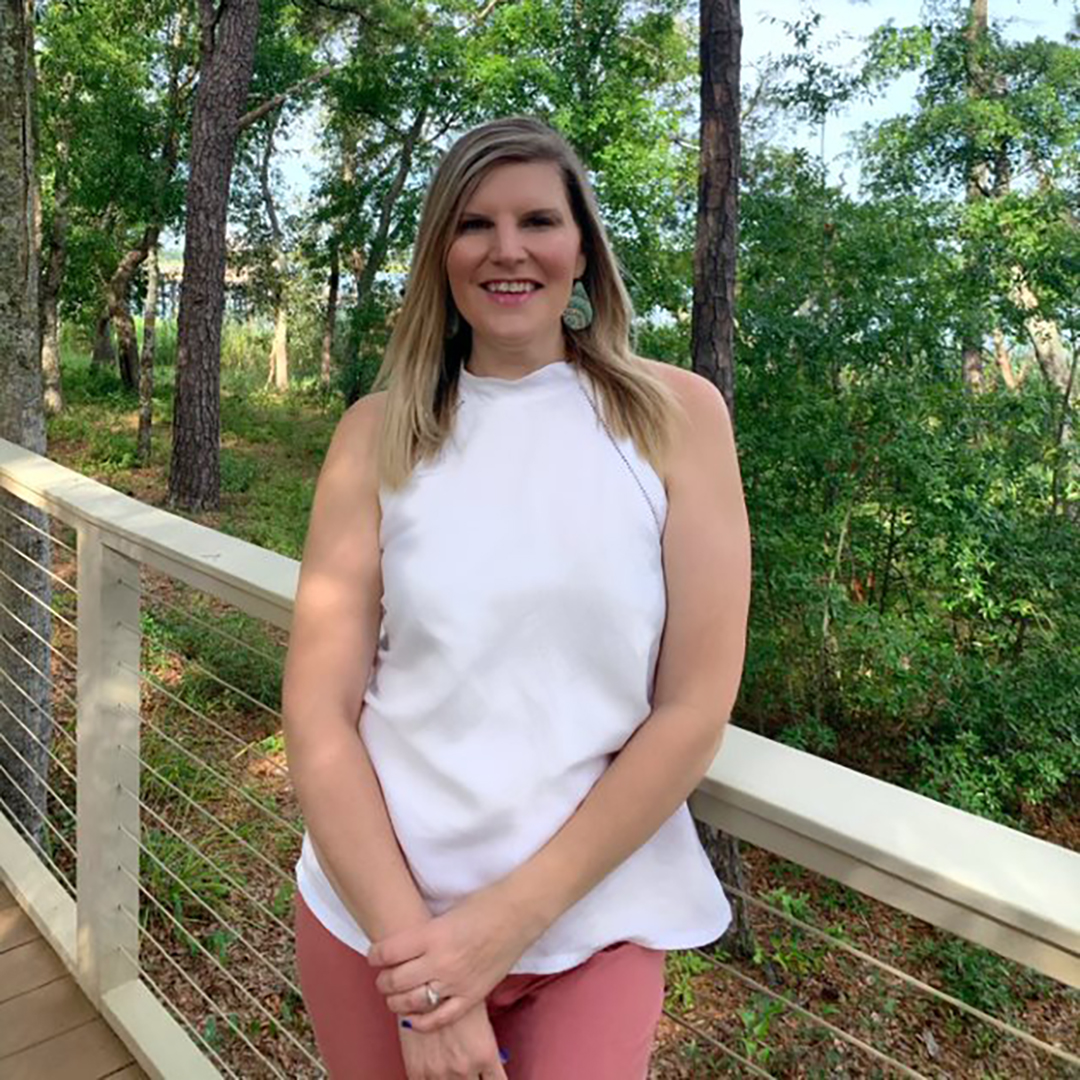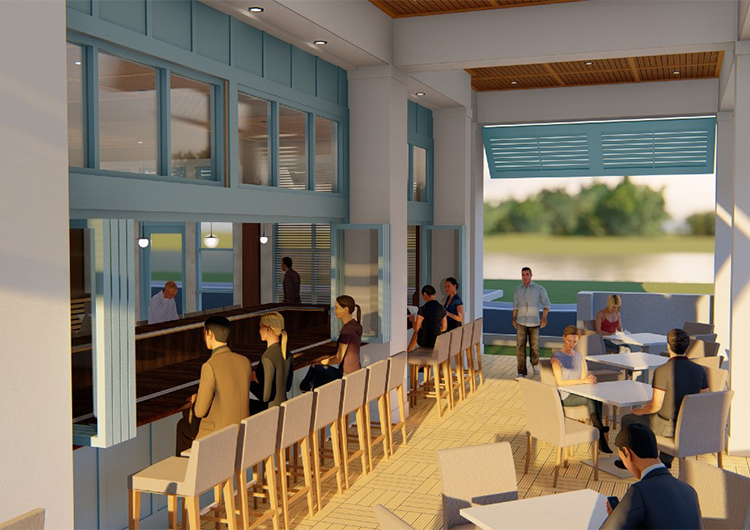Creating a physician pipeline
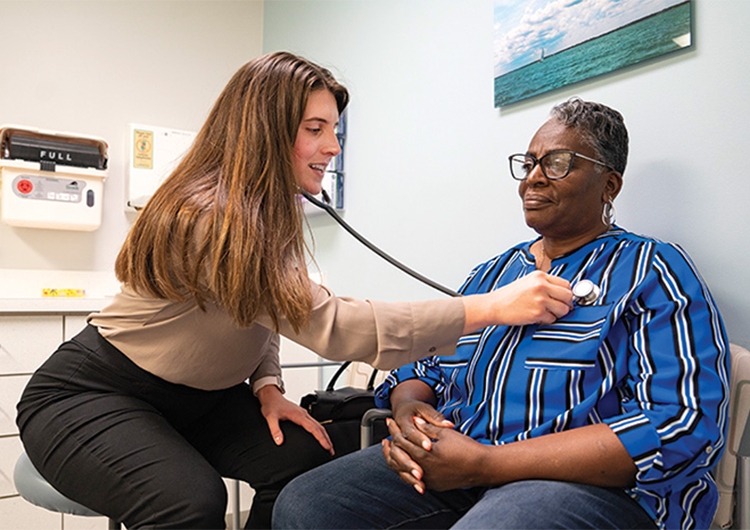
Medical student Joanmarie Lewandowski works with a patient at Novant Health NHRMC. A recently expanded partnership between the University of North Carolina School of Medicine and Novant Health seeks to attract and retain new physicians to the area. (Photo by Allison Joyce)
The University of North Carolina School of Medicine has had a partnership with Wilmington’s hospital for nearly 40 years.
New Hanover Regional Medical Center, which in 2021 became part of Novant Health, has routinely hosted UNC medical students fulfilling their clinical rotations in their third and fourth years of medical school in the region.
Over roughly the same number of years, NHRMC has hosted training programs for medical school graduates, called residency programs, affiliated with UNC. The oldest program, general surgery, has been training future surgeons in the local region for over 50 years. The other programs – internal medicine, OB/GYN and family medicine residency programs – have been training future specialists for decades.
As the need for more physicians continues to be a national issue, especially in fast-growing areas such as Southeastern North Carolina, health care leaders are turning to the education programs to help recruit more doctors to the area.
Those programs have expanded in scope locally in recent years.
In March 2016, UNC School of Medicine opened a branch campus in Wilmington at NHRMC. Medical students who typically stayed for about four weeks for a clinical rotation became able to train in Wilmington for an entire year. In its first year, the branch campus hosted three third-year medical students. Those students completed their last two years of medical school in Wilmington before moving on to complete their residency programs.
Then, in 2021 as part of the NHRMC sale to Winston-Salem-based Novant Health, UNC significantly expanded its program, enhancing both medical education at the UNC Wilmington campus and clinical services and research at NHRMC.
At the time, the med students and residents were one part of the negotiations among the players interested in buying the county-owned hospital. Among the other interested parties jockeying for NHRMC, Duke Health brought its medical academic credentials as a university-owned system to the table; Charlotte-based Atrium was in the midst of its partnership with Wake Forest School of Medicine.
Novant Health, which at the time did not have an academic partner, forged an agreement with UNC Health and UNC School of Medicine, pledging “to enhance medical education and clinical services” at NHRMC if Novant became the chosen buyer. Novant officials pointed out that the tie-in would expand the already long-time presence of UNC School of Medicine in New Hanover County.
“We have grown substantially since we first started. Currently, we are hosting 21 third-year medical students and 10 fourth-year medical students at our branch campus,” said Joseph Pino, associate dean and campus director for the UNC School of Medicine Wilmington campus and senior vice president of medical education for Novant Health.
Before the transition to this role, Pino (below) served as vice president of graduate medical education at NHRMC.

“Our longer-term goal is to have 30 third-year students with nearly as many students staying for their fourth year of medical school by the year 2025,” Pino said about the local program.
Training to become a physician is long: four years of undergraduate school followed by four years of medical school, plus three to five years and sometimes up to seven years or more of postgraduate training. Through the growing academic partnership, medical leaders hope to retain the UNC graduates in residency programs and have them stay as practicing physicians in the region.
Pino noted that the United States needs more physicians and health care providers. Data reported by the Association of American Medical Colleges in 2021 identified a shortage of between 37,800 and 124,000 physicians by 2034. That includes both primary care physicians and specialists.
Pino said it’s significant that medical students are now able to attend the Wilmington branch campus for their final years of medical school.
“It is important because they call Wilmington home. The students become invested in the community. They support the community through their training to care for patients, they do volunteer work and more,” he said.
Rebecca Purvis is a Novant Health OB/GYN resident who spent her last two years of medical school at UNC School of Medicine’s Wilmington campus. Although she is moving to Knoxville, Tennessee, for three years for a maternal-fetal medicine fellowship, she and her husband are planning to return to the Wilmington area.
“This place feels like home. I loved the people, the nurses, the residents, the faculty and the patient population,” she said.“I knew I would receive excellent training as a resident, and I knew this is where I belonged. I definitely think one of the biggest attributes that attracts med students to study here is the location near the beach. And in regards to the hospital, there are less students and learners overall, so there are many more ways to get hands-on experience in smaller group learning environments.”
Pino said having doctors who choose to return to Wilmington is key for the local health care landscape.
“They know the culture of the community and will plant roots for many years to come,” he said. “We are creating a pipeline of future doctors.”
Students and resident physicians work alongside the hospital’s medical staff. Working together in the care of patients, the team engages in dialogue, asking questions and finding answers to how best to diagnose and treat patients.
“I was able to form close relationships to the attendings and residents who I worked with, which allowed me to feel comfortable asking questions while also gaining hands-on experience,” Purvis said.
The partnership between Novant Health and UNC has driven additional growth beyond the increased number of medical students at the Wilmington branch campus. Within the past two years, clinical research and pediatric subspecialty clinical care has also expanded.
Novant Health is also developing a psychiatry residency program. Access to behavioral health care is challenging. Developing the pipeline of future behavioral health physicians has been a focus.
“With the growth of our community and the challenges from the pandemic, the demand for mental health care has increased,” Pino said. “We have received accreditation and approval to begin a psychiatry residency program with plans to recruit our first class of psychiatry resident physicians in July 2024. This program will be unique. We will be working with Naval Medical Center Camp Lejeune to train both civilian and military psychiatry resident physicians. By doing so, we will increase the number of new psychiatrists serving our civilian and military populations.”
In addition to creating the psychiatry residency program, Novant Health is also in the process of creating a rural track for its family medicine residency program.
North Carolina has many concentrated populations with large rural areas in between metro areas with limited access to health care. Novant Health is partnering with UNC and Black River Health Services in Pender County to create this rural residency track.
“Our goal is to train family medicine resident physicians in rural Pender County,” Pino said. “There is good data to support that when physicians train in a rural area, they tend to practice in the rural area. It’s important to bring medical access closer to home serving rural North Carolina.”
The quality of care has impacts beyond the health system’s facilities. It also plays a key role in recruiting beyond just the medical field.
“With the growth of our region, we have seen a growing number of businesses and retirees in our area. Access to health care is important to both,” Pino said. “With our expanding branch campus and the creation of new physician training programs, we will expand the number of health care providers and access to care in our region.”

